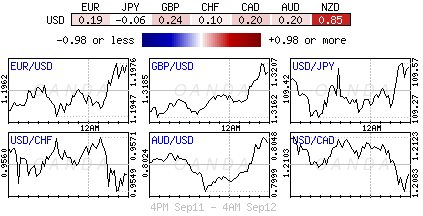Tuesday September 12: Five things the markets are talking about
The U.S dollar is finding it difficult to build on yesterday’s strong start to the week as investor concerns about lackluster inflation stateside continues to linger ahead of key data this week.
The market will be keeping a close watch on Thursday’s U.S consumer price data and Friday’s U.S retail sales as it tries to gauge whether the U.S economy is strong enough to allow the Fed to hike rates a third time this year. The current CME FedWatch tool projects a +27% probability of one +25 bps rate hike in December.
The overnight appetite for riskier assets is being supported by a lack of further confrontational developments from North Korea. Safe-haven assets such as U.S Treasuries and gold have managed to give back most of their recent gains.
Note: The UN Security Council approved a watered-down proposal to punish the nation for its latest missile and nuclear tests, omitting an oil embargo and a freeze of Kim Jong’s personal assets.
1. Stocks hit record highs as Irma weakens
Global equities have climbed to record highs overnight as easing tensions over North Korea and signs that Hurricane Irma was causing less damage than feared.
In Japan, stocks climbed to their highest in a month with financials leading the way mirroring S&P’s record close yesterday. The Nikkei rose +1.2%, the highest closing level since Aug. 8, while the broader Topix added +0.9%, with 32 of its 33 subsectors in positive territory.
In South Korea, the Kospi index rose +0.3%, while down-under, Australia’s S&P/ASX 200 Index added +0.6%.
In Hong Kong, equities skip the bullish global move and hover atop of their two-year highs. The Hang Seng index inched up +0.1%, while the China Enterprises Index climbed +0.2%.
In China, shares inched higher with the blue-chip CSI300 index rallying +0.3%, while the Shanghai Composite Index added +0.1%.
In Europe, Germany’s DAX Index climbed +0.4%, reaching its highest print in two-months on its sixth consecutive advance, while in the U.K, the FTSE 100 Index is under pressure after today’s stronger inflation numbers (see below) and a stronger pound (£1.3250).
U.S equities are set to open in the black (+0.1%).
Note: Apple Inc. reveals its newest products later today.
Indices: Stoxx600 +0.5% at 381.5, FTSE -0.1% at 7405, DAX +0.5% at 12539, CAC-40 +0.5% at 5204, IBEX-35 +0.3% at 10355, FTSE MIB +0.2% at 22169, SMI +0.6% at 9034, S&P 500 Futures +0.1%
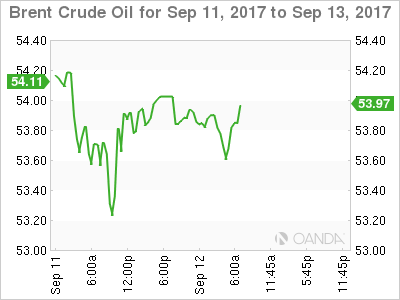
2. Oil steady as market assess U.S hurricane impact
Oil prices are steady as the market weighs up the dampening effect on demand of Hurricane Irma versus refinery restarts in the wake of Hurricane Harvey that should lead to more crude oil processing.
Brent crude futures are down -4c, or -0.07% at +$53.80 per barrel, while U.S West Texas Intermediate (WTI) crude is down -3c, or -0.06% at +$48.04 a barrel.
U.S crude inventories likely rose last week following the hurricane impact, while refined product stockpiles are forecasted to have declined.
The API and the EIA data last week are expected to show that crude stocks likely rose in the week ended Sept. 8.
Note: The API is due to release its data for last week at 4:30 pm EDT today and the EIA report is scheduled at 10:30 am EDT Wednesday.
Note: OPEC Secretary General Barkindo reiterated the view that the oil market rebalances remains in progress with output growth slightly decelerating – OECD commercial oil stocks were +195m barrels above the five-year average in July.
Ahead of the U.S open, gold has hit its lowest price in more than a week as receding concerns over N. Korea’s nuclear ambitions and the impact of Hurricane Irma supports further gains in equities, softening demand for the ‘yellow’ metal as a haven from risk. A steadier tone to the dollar is managing to take some pressure off the metal. Spot gold is trading atop of its two week lows at +$1,322.85.
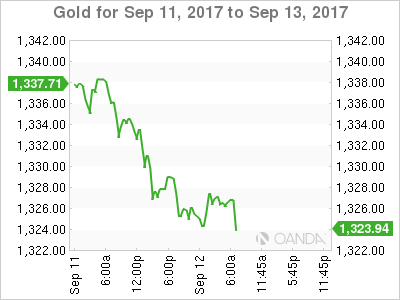
3. Sovereign yields back up
Hurricanes Harvey and Irma are likely to trigger near-term weakness in U.S economic data leading to a challenge for the Fed regarding the appropriate stance of monetary policy.
The market expects the Fed to proceed with caution and this likely means postponement of any rate hike in December – the odds for a December rate hike have now fallen to a +27% probability.
Risk on trading has sovereign yields backing up a tad overnight. The yield on 10-year Treasuries gained +1 bps to +2.14%, the highest in more than a week.
In Germany, the 10-year Bund yield gained +1 bps to +0.35%, while in the U.K 10-year Gilt yield advanced +2 bps to +1.045% supported by this morning’s inflation data ahead of Thursday’s Bank of England (BoE) monetary policy decision.
In Japan, 10-year JGB’s bond yield rallied to a three-week high, backing up +3 bps to +0.025%.
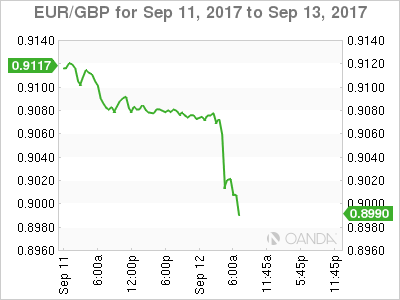
4. Sterling’s stellar performance
With risk-on sentiment remaining intact for a second consecutive day as concerns over Hurricane Irma and North Korea subsides has U.S Treasury yields backing up and tentatively supporting the U.S dollar, but is it sustainable?
Ahead of the open stateside, USD/JPY is higher by +0.3% at ¥109.70, a three week high while EUR/USD is steady at €1.1965.
The standout currency is GBP – the pound (£1.3262) has rallied aggressively after U.K consumer inflation data this morning came in better than expected (see below). EUR/GBP is down -0.6% at €0.9021.
A stronger-than-expected inflation report would be something that the BoE would have to consider at Thursday monetary policy meeting. The data may possibly bring more members in support of a raise in interest rates.
However, inflation is thought to be rising due to a weaker pound, not due to fundamentals. The pound has also found support from the U.K Parliament yesterday voting against opposition Labor party’s attempt to block E.U withdrawal bill, effectively passing its first parliamentary hurdle.
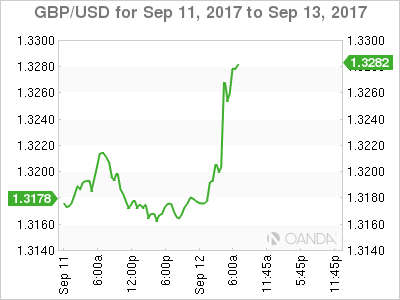
5. UK Inflation Speeds Up in August
Data this morning showed that U.K annual inflation rose to +2.9% (+2.8% e) in August, driven higher by the rising price of clothing and petrol.
Other data from the U.K’s Office for National Statistics also revealed a rise in the producer price index – +1.6% (+1.2% e) in August, supported by the higher price of fuel – the first gain in six-months.
Increasing concerns about the squeeze on the cost of living will make Thursday’s Bank of England (BoE) interest rate decision a tad more interesting.
